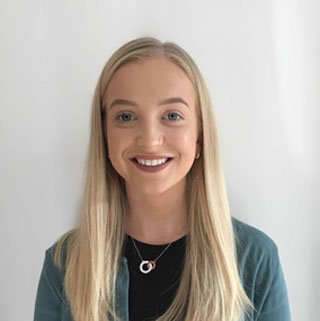Mairi is a first year MB-PhD student in the labs of Professor Gareth Inman (GLA) and Professsor Charlie Gourley (EDI). Her project focuses on one of the main types of skin cancer, cutaneous squamous cell carcinoma, aiming to identify drivers and therapeutic vulnerabilities for its metastasis.
Why did you choose to do a MB-PhD and what attracted you to the TRACC programme?
I have had a long-standing interest in scientific research, and knew I wanted to complete a PhD at some point in my career. This was cemented in my intercalation year in Anatomy and Development. When I saw the opportunity to do a MB-PhD with Cancer Research UK, there were many factors to consider. Leaving medicine and my cohort for three years was not a light decision. After fully exploring the TRACC programme, I decided being involved in research from such an early point in a medical career has many benefits.
How did you select your project?
After meeting with many lab groups from both Edinburgh and Glasgow Universities, the project I chose ended up being the one that excited me most when I spoke about it to friends and family. I had a large spreadsheet weighing up different factors to help me compare the very varied options. I focused on the skills I would gain and the subject area. It was a tricky decision, and I’m sure I would have enjoyed many of the projects available to me.
Do tell us a little bit about your PhD project
I am investigating cutaneous squamous cell carcinomas (cSCC), responsible for one quarter of all skin cancer deaths. Specifically, I am interested in mutations that drive metastasis. Through bioinformatics and in vitro and in vivo validation studies, I will interrogate potential genes and pathways involved in disease progression in cSCC. This work has the potential to elucidate possible therapeutic vulnerabilities.
What has it been like so far? Is there anything you found challenging?
Overall, it has been a positive experience. I find my project fascinating and I thoroughly enjoy the training opportunities such as building new skills in analysis of biological datasets. Learning to code has been fantastic; staff and fellow students have been very patient and friendly when helping me. Moving to a new city during a pandemic has, however, been a challenge. Having left my support network behind, and the lockdown rules prohibiting us to meet others, I have found working from home isolating. It is common for PhD students to feel this way; it is very different to going to medical lectures with 200+ friendly faces! I look forward to working on campus when restrictions ease and meeting the other PhD students in my cohort.
What advice would you give to someone applying for the programme?
I would advise you to meet with principal investigators in cancer research and attend lab meetings to ask questions and gauge what sort of qualities the organisers of the TRACC programme are looking for in a candidate. It is also good to meet current PhD students. Not only will you discover if it is the right choice for you, you will likely learn new things that you can use to impress in an interview! Meeting people from various disciplines is valuable to gain breadth of knowledge.
